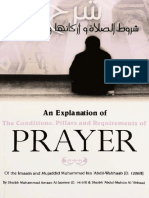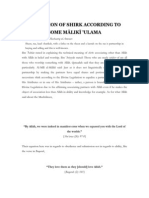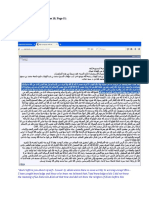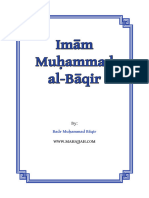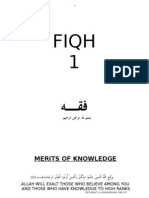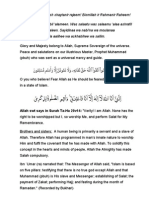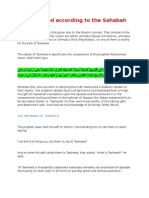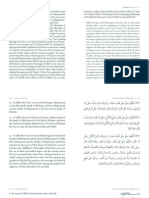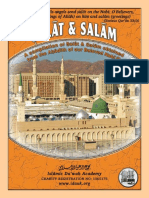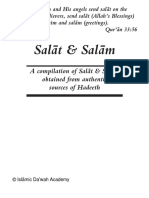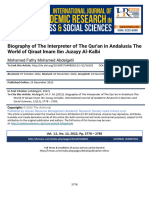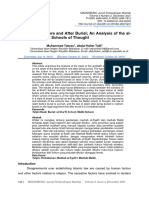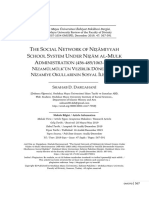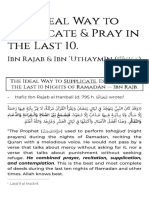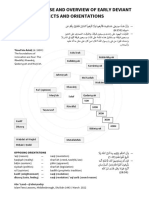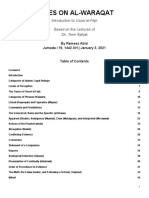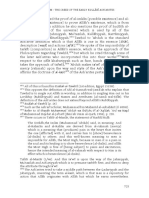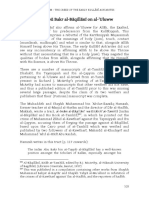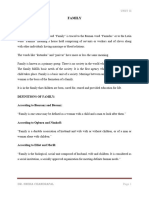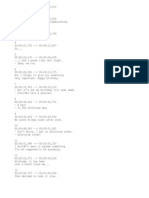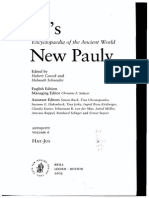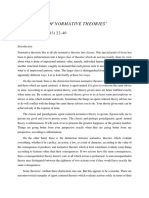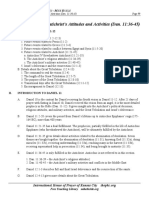S E N D I N G S A L ĀT U P O N
ALLĀH’S MESSENGER H
AND THE BENEFITS ARISING FROM IT
A B Ū TA L H A H DĀW Ū D B U R B A N K ( V )
I N A L I T I S A A M B I S S U N N A H .W O R D P R E S S . C O M , B E N E F I T S F R O M T H E
B O O K O F I B N A L- Q AY Y I M ( V ) ‘J A L Ā · U L- A F H Ā M F Ī F A D L I S - S A L ĀT I
W A S - S A L Ā M ‘A L Ā K H A Y R I L A N Ā M ( H )
D S G N I B N TA J C A R E E M
�#
ين
العامل� والصالة والسالم احلمد هلل رب
الن� بعده
عىل من ب ي
S E N D I N G S A L ĀT U P O N T H E M E S S E N G E R H
�Collected by Imām al-Bukhārī in his sahīh
(no.3370), ... Ka’b ibn ‘Ujrah said: We asked
Allāh’s Messenger (H) saying, ‘O Allāh’s
Messenger! How should one (ask Allāh to) send
as-Salāt upon you and the ahl al-Bayt’, ...
He (H) said, ‘say “Allāhumma salli ‘alā
Muhammad...”’
َّ َ ُ َ َّ َ ُ َ ّ َ ُ َّ
امك،الله َّم ص ِل عل مم ٍد وعل ِآل مم ٍد
َ َّ َ َ ْ َ َ َ ْ َ َ ْ َّ َ
إنك،� وعل ِآل بإ� ِاه ي،�صليت عل بإ� ِاه ي
َ َّ َ ُ َ ْ َ َّ ُ َّ ٌ َ ٌ َ
اللهم ب� ِرك عل مم ٍد وعل ِآل،ِحيد ِجميد
َ َ َْ َ َ ْ َ َ َّ َ ُ
وعل ِآل،� امك ب�ر كت عل بإ� ِاه ي،مم ٍد
ٌ َ ٌ َ َ َّ َ َ ْ
.بإ� ِاه ي� إنك ِحيد ِجميد
A L- B U K H Ā R Ī 3 3 7 0 P 1
�Imām an-Nasā·ī (V) reported in
his ‘Sunan’ (no.1297):
Ishāq ibn Mansūr related to us, saying:
Muhammad ibn Yūsuf narrated to us,
saying: Yūnus ibn Abī Ishāq narrated to us:
from Burayd ibn Abī Maryam who said:
Anas ibn Mālik narrated to us, saying:
Allāh’s Messenger (H) said:
“Whoever sends a single salāt upon me,
then Allāh will send ten salawāt upon him,
and ten sins will be removed from him,
and he will be raised by ten ranks”.
Shaykh al-Albānī (V) declared it ‘Sahīh’.
A N - N ASĀ· Ī 1 2 9 7 P 2
�Shaykh al-Albānī (V) said in ‘sifatus-salāt’
(p.165): The most correct saying about the
meaning of salāt upon the Prophet (H)
is the saying of Abul-‘Āliyah:
Allāh’s salāt upon His Prophet is His extolling
him ((to the Angels)) and exalting him, and
the salāt of the Angels and others upon him
is to request this from Allāh (The Most High);
and what is meant is seeking the increase, not
the initiation of salāt. al-Hāfidh (ibn Hajr)
mentioned it in ‘al-Fat·h’.
S I F AT U S - S A L ĀT A L- A L B Ā N Ī P.1 6 5 P 3
� Imām ibnul-Qayyim (V), in his book
‘Jalā·ul-Afhām fī fadlis-Salāti was-Salām
‘alā khayril anām (H)’, mentions forty
benefits arising from sending salāt upon Allāh’s
Messenger (H):
(The points with ** beside them are not
authentically established)
1 Compliance with the Command of Allāh (The
Perfect and Most High,). [i.e. in Āyah 65 of
Sūratul-Ahzāb].
2 Conformity with Him (He The Perfect) in
sending salāt upon him, even though the two
forms of salāt are different. So our salāt upon
him is a supplication and a request, whereas
the salāt of Allāh (The Most High) upon him is
extolling and ennobling….
3 Conformity with the Angels in it.
4 Attaining ten salawāt ((plural of salāt)) from
Allāh by the person who sends salāt upon
him once.
I B N A L- Q AY Y I M P 4
� 5That he is raised by ten levels.
6That he has ten good deeds written for him.
7That ten sins are erased from him.
8That it is to be hoped that his supplication will
be responded to if he precedes it with that. So
it causes the supplication to ascend to the Lord
of creation when prior to this it was suspended
between the heavens and the earth.
9It is a means to attain his (H)
Intercession, if it is accompanied by a request
for al-Waseelah (a singular station in Paradise)
for him, or even if it is on its own…
10It is a means for forgiveness of sins …
11It is a cause for Allāh to suffice the servant with
regard to whatever concerns him.
I B N A L- Q AY Y I M P 5
�12 It is a means for the person to gain nearness to
him (H) on the Day of Resurrection…
13 (It has the position of being like an act of
charity upon a needy person.)**
14 It is a cause for the fulfilment of your needs.
15 It is a cause for Allāh to send salāt upon the
person, and for the salāt of His Angels
upon him.
16 Ittheisperson.
a cleansing (zakāt) and purification for
17 (It is a cause for the servant to receive glad
tidings of paradise before his death…) **
18 (It is a means for salvation from the terrors of
the Day of Resurrection…) **
19 It is a cause for the Prophet (H) to
respond to the one who sends salāt and
salām upon him.
I B N A L- Q AY Y I M P 6
�20(It is a cause for the servant to remember that
which he has forgotten.) **
21It is a cause of good for the gathering, and for
its not becoming a source of regret for its people
on the Day of Resurrection.
22(It is a means to repel poverty…) **
23It repels from the person the description of
being a miser if he sends salāt upon him
whenever he (H) is mentioned.
24He becomes saved from being supplicated
against that his nose should be cleaved in the
dust, for abandoning it when he (H)
was mentioned.
25It puts its companion upon the path to Paradise,
and it causes the one who abandons it to err
with regard to it.
I B N A L- Q AY Y I M P 7
�26 It saves from the stench of a gathering wherein
Allaah and His Messenger are not mentioned,
and where Allāh (The Most High) is not praised
and extolled, and where salāt is not sent upon
His Messenger (H).
27 It is a means for the completion of the speech
which was begun with praise of Allāh and salāt
upon His Messenger (H).
28 (It is a cause for the servant’s light to be
increased upon the Bridge (as–Sirāt).) **
29 It takes the servant away from coarseness.
30 It is a cause for Allāh (The Perfect) to bestow
favourable praise upon the one who sends salāt
upon him, praising him to the inhabitants of
the heavens and the earth. This is because the
one who sends salāt upon him is asking Allāh
to extol His Messenger, and to honour, and
ennoble him. So recompense conforms to the
type of deed, so the one who sends salāt must,
in turn, receive some form of this.
I B N A L- Q AY Y I M P 8
�31It is a cause of blessing for the one who
sends salāt, in his self, his deeds, and
his life, and the means of his welfare.
This is because the one who sends salāt
is supplicating to his Lord that He should
bless him and his true followers, and
this supplication will be answered, and
recompense conforms to the deed.
32It is a means for his attaining the Mercy of
Allāh, since mercy is either the meaning of
the salāt (upon the saying of some; or it is
otherwise something necessitated by it, and
required from it) upon the correct saying.
So the one who sends salāt upon him must
certainly receive Mercy.
I B N A L- Q AY Y I M P 9
�33 It is a means to perpetuate his love of the
Messenger (H), and to increase it, and
to multiply it; and that is one of the essential
fundamentals of Īmān, which it will not be
complete without; since the more a servant
mentions the one he loves, and remembers him
in his heart, and remembers his fine qualities,
and those things which instil the love of him,
then his love of him will increase, and yearning
for him will grow, and this will overcome
his whole heart. But if he turns away from
mentioning him and from thinking of him and
of his fine qualities in his heart, then the love
of him will be reduced in his heart. So there is
nothing more pleasing to the one who loves than
seeing the one whom he loves, and nothing gives
greater pleasure to his heart than mentioning
him and thinking of him and of his fine qualities.
So when this becomes strong in his heart, then
his tongue will praise and extol him…
I B N A L- Q AY Y I M P 10
�34That salāt upon him (H) is a cause of his
loving that person. So because it is a cause for
the one who sends salāt upon him to increase in
love of him, likewise it is a cause for him to love
the one who sends salāt upon him (H).
35It is a means for the guidance of the person and
for his heart to have life…
36(It is a cause for the one who sends salāt upon
him (H) to have his name presented to
him, and for his being mentioned
to him…) **
37(It is a cause for the feet to be planted firmly
upon the Sirāt, and for the person’s passing
over it…) **
38That sending salāt upon him fulfils the
slightest part of his right…
I B N A L- Q AY Y I M P 11
�39 That it comprises remembrance of Allāh and
thankfulness to Him and recognition of His
Favour upon His servants in sending him. So
the one who sends salāt upon him (H)
includes in his salāt upon him the remembrance
of Allāh and remembrance of His Messenger…
40 That salāt upon him from the person is
supplication (du’aa·), and the persons du’aa· to
his Lord and his requests to his Lord is of two
types:
(i) His requesting his own needs and concerns,
and whatever he requires throughout the night
and the day. So this is supplication and request,
and is to give precedence to that which the
servant loves and seeks;
I B N A L- Q AY Y I M P 12
�40(ii) His requesting that He should extol His
chosen and beloved servant, and increase him in
nobility and honour, and make mention of him,
and elevate him. So there is no doubt that Allāh
(The Most High) loves that, and his Messenger
(H) loves it. So the one who sends salāt
upon him (H) has turned his requests, that
which he desires, and that which he seeks towards
that which is loved by Allāh (The Most High)
and His Messenger; and he has given preference
to that over his own needs and requirements.
Indeed this that he seeks has become the most
beloved of things to him, and that which he most
prefers. So he has given preference to that which
Allāh and His Messenger love over that which he
himself loves. So he has given preference to Allāh
and to what He loves over everything else, and
recompense conforms to the action. So whoever
gives preference to Allāh over everything else, then
Allāh will give preference to him over others…’’
[(**) The verifier of the book (Zā·id an-Nushayree)
indicates that these points (nos.13, 17, 18, 20, 22,
28, 36, & 37) are based upon weak ahādīth.]
I B N A L- Q AY Y I M P 13
� Further points made by ibnul-Qayyim
in the book:
1Persistence upon remembrance (dhikr) is a
cause for love to persist; remembrance is for
the heart like water is for the plants; indeed
it is like water is for the fish: it cannot live
without it. And it is of different types:
(i) Remembering Him By His names, His
attributes, and by praising Him with them.
(ii) Tasbīh (saying subhānallāh: I declare
Allāh free of all imperfections) of Him, and
tahmīd (saying al-Hamdu lillāh: All praise is
for Allāh), and takbīr (saying Allāhu Akbar:
Allāh is greater than everything), and tahlīl
(saying Lā ilāha illallāh: None has the right
to be worshipped except Allāh), and declaring
His Glory; and this is what is usually termed as
dhikr by the later people.
I B N A L- Q AY Y I M P 14
�1(iii) Remembering Him through His Rulings,
and His Commands and Prohibitions; and this is
the dhikr of the people of knowledge; rather the
three types are their remembrance of their Lord.
(iv) And from the most excellent dhikr of Him is
to make dhikr of Him by His Words.
He (The Most High) said:
ً َ َ ُ َ َّ َ ْ َ َ َ ْ َ ْ َ َ
ومن أعرض عن ِذ ك ِري ف ِإن ل م ِعيشة
ْ َ َ ْ َ َ ُ ُ ْ ََ ً َ ن
عٰ َ �ه ي ْوم ال ِق َيام ِة أ
ُ ضنك و� ش
Meaning: And whoever turns away from the
remembrance of Me than he shall have a life of
difficulty and We shall raise him up blind on the
Day of Resurrection.
[Sūrah TāHā (20):124]
I B N A L- Q AY Y I M P 15
�1SoHe His remembrance here is His Speech, which
sent down to His Messenger; and
He (The Most High) said:
َّ ْ ُ ُ ُ ُ َُّّ نَ َ ُ َ َ ْ َ ئ ن
ِ ال ِذ ي� آمنوا وتطم ِ� قل بو�م ِب ِذك ِر
ۗ الل
ُ ُ ْ ْ َ َّ
ُالل تط َم ئ ِ نُّ� القلوب ْ َ َ
ِ أل ِب ِذك ِر
Those who truly believe and whose hearts find
repose in the remembrance of Allāh: Indeed
in the remembrance of Allāh the hearts of the
Believers find repose.
[Sūratur-Ra’d (13):28]
(v) And from the remembrance of Him
(He The Perfect) is to make supplication to Him,
and to seek His forgiveness, and to humbly
beseech Him.
I B N A L- Q AY Y I M P 16
�2Here there is a fine point for one who teaches
his nation his Religion and that which he came
with, and who calls them to it, and encourages
them upon it, and has patience upon that; and it
is that the Prophet (H) will receive extra
reward in addition to the reward for his own
deeds, receiving reward equal to that of all those
who follow him. So the caller to his Sunnah and
his Religion, and the one who teaches good to the
Ummah, if he intends to bring about increase in
this share for Allāh’s Messenger (H) and
its being granted to him; and his goal in calling
the creation to Allāh is to draw closer to Him, by
guiding His servants, and to augment the share
of Allāh’s Messenger (H) with the reward
of those who obey him-whilst they still receive
their full rewards; then he will receive the reward
for his call and his teaching, in accordance with
this intention; and that is Allāh’s Bounty which
He gives to whomever He wishes, and Allāh is the
Possessor of tremendous Bounty.
I B N A L- Q AY Y I M P 17
�Translated and collected by Abū Talhah
Dāwūd ibn Ronald Burbank (V) in
alitisaambissunnah.wordpress.com under the
category ‘Du`aa’. Also collected by Abū Hakīm
Bilāl in ah-sp.com under the title ‘The Virtues
of Sending Salām Upon the Messenger of Allāh’.
Designed & Compiled by ibn Taj Careem
in t.me/TheBeneficialKnowledge
وصىل هللا عىل نبينا حممد
وعىل آهل وحصبه وسمل
S E N D I N G S A L ĀT U P O N T H E M E S S E N G E R H








